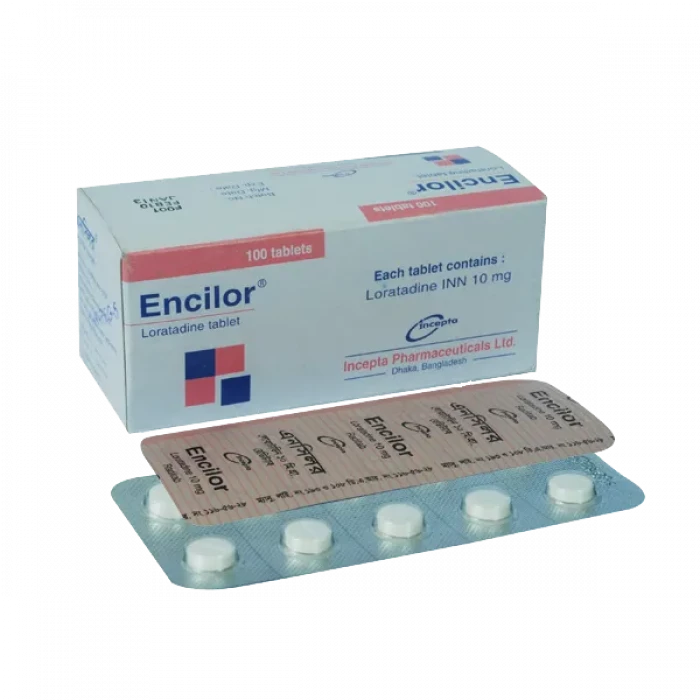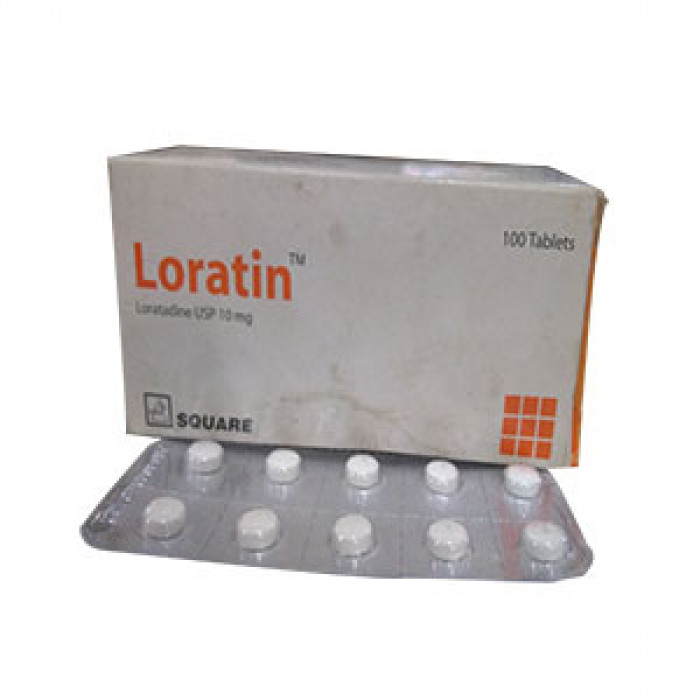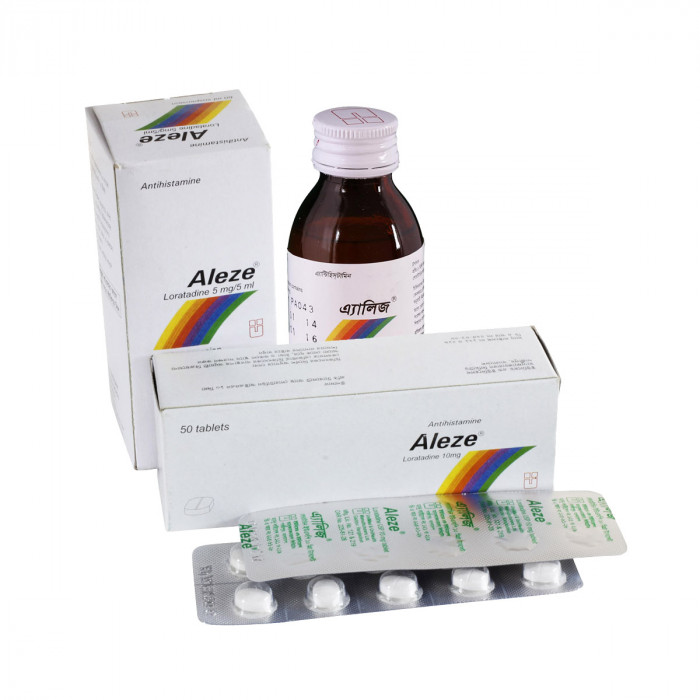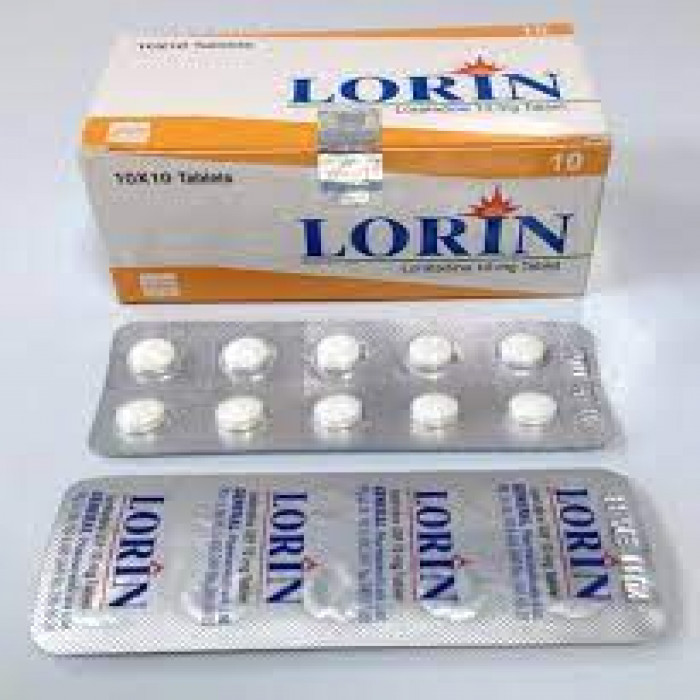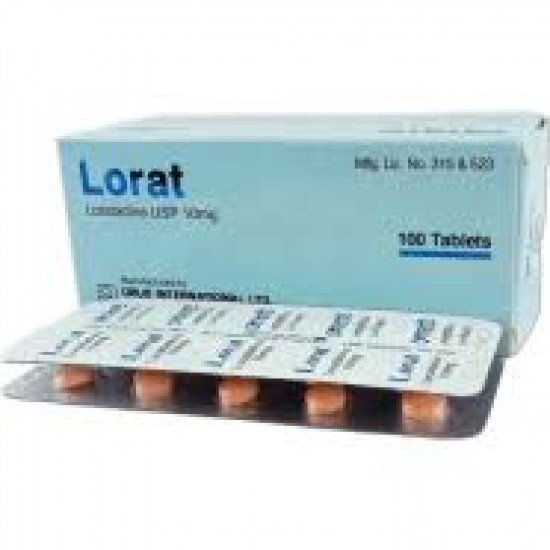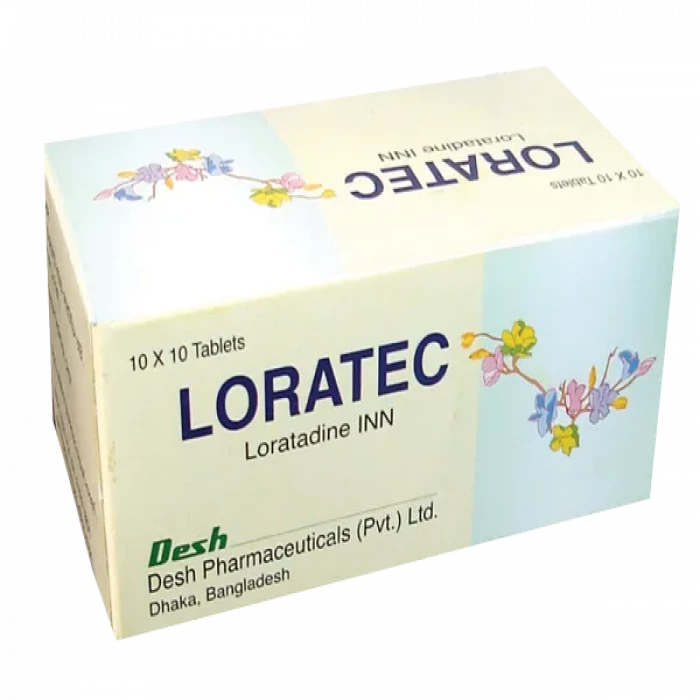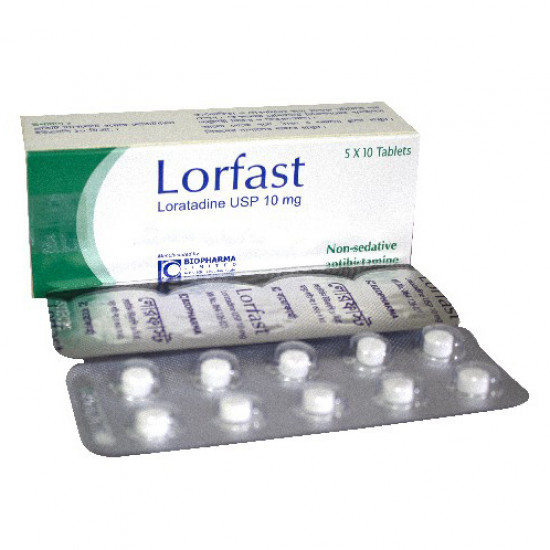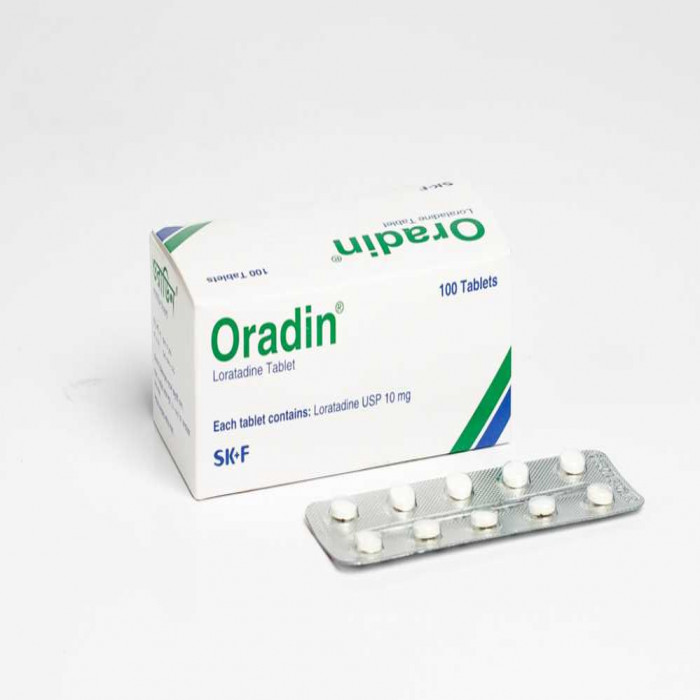
✔ 100% Authentic Product
👁️ Currently Viewing 5595
Loratadine acts as an antihistamine and is used to treat allergic rhinitis and urticaria. It also effectively treats hives and other major skin reactions. The primary use of Loratadine is to relieve nasal and non-nasal symptoms of seasonal allergic rhinitis.
Discount
Price: ৳ 38
MRP:
৳
40
5%
Off

100% Genuine Products, Guaranteed

Safe & Secure Payments, Always

Fast, Secure & Efficient Delivery

Proper Packaging
 Cash on Delivery - All over Bangladesh
Cash on Delivery - All over Bangladesh Regular Delivery - 12-24 Hours, Dhaka City* Charge Tk.39-59
Regular Delivery - 12-24 Hours, Dhaka City* Charge Tk.39-59 Regular Delivery - 24-48 Hours, Other Cities* Charge Tk.99-110
Regular Delivery - 24-48 Hours, Other Cities* Charge Tk.99-110
 ফ্রি ডেলিভারিঃ - ৯৯৯ টাকা+ অর্ডারে, ঢাকা
শহরে
ফ্রি ডেলিভারিঃ - ৯৯৯ টাকা+ অর্ডারে, ঢাকা
শহরে ফ্রি ডেলিভারিঃ - ২৯৯৯ টাকা+ অর্ডারে, ঢাকার
বাহিরে
ফ্রি ডেলিভারিঃ - ২৯৯৯ টাকা+ অর্ডারে, ঢাকার
বাহিরে
100% Genuine Products, Guaranteed
Safe & Secure Payments, Always
Fast, Secure & Efficient Delivery
Proper Packaging
 Cash on Delivery - All over Bangladesh
Cash on Delivery - All over Bangladesh Regular Delivery - 12-24 Hours, Dhaka City* Charge Tk.39-59
Regular Delivery - 12-24 Hours, Dhaka City* Charge Tk.39-59 Regular Delivery - 24-48 Hours, Other Cities* Charge Tk.99-110
Regular Delivery - 24-48 Hours, Other Cities* Charge Tk.99-110 ফ্রি ডেলিভারিঃ - ৯৯৯ টাকা+ অর্ডারে, ঢাকা
শহরে
ফ্রি ডেলিভারিঃ - ৯৯৯ টাকা+ অর্ডারে, ঢাকা
শহরে ফ্রি ডেলিভারিঃ - ২৯৯৯ টাকা+ অর্ডারে, ঢাকার
বাহিরে
ফ্রি ডেলিভারিঃ - ২৯৯৯ টাকা+ অর্ডারে, ঢাকার
বাহিরে
✅ Description:
Oradin 10mg Tablet is primarily used to treat allergic rhinitis and urticaria. It should be used with caution in patients with kidney and liver problems. It is not recommended for use in pregnant women or breastfeeding mothers, so it's important to consult a doctor before taking this medicine if you fall into these categories.
Oradin 10mg Tablet is also an antihistamine used to relieve symptoms of allergies such as hay fever, conjunctivitis, eczema, hives, insect bite reactions, and some food allergies. It contains loratadine as well and is a non-drowsy antihistamine. Common side effects of Oradin10mg Tablet include drowsiness or sleepiness, headaches, fatigue, and nervousness. These side effects are usually temporary and may not affect everyone.
It's important to use these medications as prescribed by a doctor and not exceed the recommended doses or duration of use. If you have any skin reactions or irritations to any medicine, it's advisable to consult your doctor before using Oradin 10mg Tablet. Additionally, inform your doctor about your medical history and other medications you're currently taking to ensure there are no potential adverse effects or interactions.
Please note that Oradin10mg Tablet is not recommended for children below two years of age, while Oradin10mg Tablet is not recommended for children below six years of age. The right dose for children will depend on their age, body weight, and specific disease condition. If you experience any bothersome side effects from either medication, it's best to consult your doctor for further guidance.
Safety Advices

Alcohol
UNSAFE
Oradin 10mg Tablet may cause excessive drowsiness with alcohol.

Pregnancy
CONSULT YOUR DOCTOR
There is limited information about the effects of Oradin 10mg Tablet on human pregnancy. Use only if prescribed by your doctor. Consult your doctor before taking any medicine during pregnancy.

Breastfeeding
CONSULT YOUR DOCTOR
Oradin 10mg Tablet passes into breast milk and may cause harm to the newborn baby. Hence, it should not be used by breastfeeding women.

Driving
CAUTION
Oradin 10mg Tablet has no impact on the ability to drive. However, if you feel drowsiness or dizziness after taking this medicine, avoid driving.

Kidney
CAUTION
Oradin 10mg Tablet should be used with caution in patients having kidney problems. Consult your doctor before taking Oradin 10mg Tablet.

Liver
CAUTION
Oradin 10mg Tablet should be used with caution in patients having liver disease. Consult your doctor before taking Oradin 10mg Tablet.
✔️ Uses of Oradin10mg Tablet
- Allergic conditions [hay fever, conjunctivitis (red, itchy eyes)
- Eczema
- Hives (urticaria, nettle rash)
- Reactions to insect bites and stings, and some food allergies]
✔️ How does Oradin10mg Tablet work?
It treats allergy symptoms such as itching, swelling, and rashes by blocking the effects of a chemical messenger (histamine) in the body.
✔️ Side Effects of Oradin10mg Tablet
- Headache
- Fatigue
- Hypotension
- Palpitations
- Tachycardia
- Anxiety
- Depression
- Breast Pain
- Pharyngitis
✔️ Quick Suggestions:
- Your doctor has prescribed Oradin 10mg Tablet to help relieve allergy symptoms such as itching, swelling, and rashes.
- As compared to other similar medications, it is much less likely to make you feel sleepy.
- Be cautious while driving or doing anything that requires concentration as it can cause dizziness and sleepiness.
- Do not drink alcohol while taking this medication as it may cause increased sleepiness.
- Stop taking Oradin 10mg Tablet at least three days before taking an allergy test as it can affect the test results.
- Oradin 10mg Tablet should not be given to children under 12 years of age.
- Patients with underlying medical conditions like liver, kidney disorders, diabetes, convulsions, etc. should consult their treating doctor before consuming Oradin 10mg Tablet.
- Oradin 10mg Tablet should not be given to children under 12 years of age.
- Patients with underlying medical conditions like liver, kidney disorders, diabetes, convulsions, etc. should consult their treating doctor before consuming Oradin 10mg Tablet.
✔️ Indication
This drug acts as an antihistamine and is use to treat allergic rhinitis and urticaria.
✔️ Pharmacology
Loratadine is an antihistamine and a selective peripheral H1-receptor antagonist. It is commonly used as an antiallergic medication. Loratadine works by blocking the action of histamine, a substance that is released during an allergic reaction. By blocking the H1 receptors, Loratadine helps to reduce the symptoms associated with allergies, such as sneezing, itching, runny nose, and watery eyes.
One of the advantages of Loratadine is its non-sedative nature, meaning it does not typically cause drowsiness or sedation. This makes it a preferred choice for many individuals who need relief from allergy symptoms but want to avoid the side effect of drowsiness that is often associated with older antihistamines. Additionally, Loratadine is considered a long-acting antihistamine, providing relief for up to 24 hours, which allows for once-daily dosing.
✔️ Dosage & Administration of Oradin10mg Tablet
- Adults and children over 12 years of age: Take one Loratadine tablet (10mg) once daily. It is typically taken in the morning or when symptoms require treatment.
- Children 2-12 years: For children with a body weight over 30 kg, they should take one Loratadine tablet (10mg) once daily. Children with a body weight below 30 kg, should take half of a Loratadine tablet (5mg) once daily.
- It's worth noting that Loratadine tablets are not recommended for use in children below 2 years of age, as the safety and efficacy of the medication have not been established in this age group.
Remember to swallow the Loratadine tablet whole and not crush or chew it. The specific dosage and duration of treatment will be determined by your doctor, taking into consideration factors such as your age, body weight, and the specific condition being treated. It's important to follow your doctor's instructions and consult them if you have any questions or concerns about the medication.
✔️ Interaction
Alcohol: Unlike some other antihistamines, Loratadine does not have potentiating effects when combined with alcohol. However, it's always advisable to use caution when consuming alcohol while taking any medication.
Hepatic Cytochrome P450 Interactions: Medications that inhibit or are processed by hepatic cytochrome P450 3A4 and 2D6 enzymes may affect the plasma concentrations of Loratadine. Cimetidine can inhibit both enzymes, while erythromycin and ketoconazole primarily inhibit cytochrome P450 3A4. Concurrent use of these medications may increase Loratadine levels in the blood, but no significant side effects have been reported.
Other Medications: It's important to discuss with your doctor any other medications, herbal preparations, or supplements you are currently taking. While there have been no reports of potentially dangerous interactions with Loratadine, it's always best to ensure there are no potential interactions that could affect your health or the efficacy of the medications you're taking.
In general, it's recommended to inform your healthcare provider about all the medications you are using, including over-the-counter drugs, herbal products, and supplements, to avoid possible drug interactions. Your doctor can provide personalized advice based on your specific situation and medical history.
✔️ Contraindications
If a patient has experienced an allergic reaction or hypersensitivity to Loratadine or any of its ingredients in the past, it is important to avoid using the medication. Signs of an allergic reaction may include rash, itching, swelling, severe dizziness, or difficulty breathing.
In case of any known hypersensitivity or previous adverse reactions to Loratadine, it is crucial to inform your healthcare provider or pharmacist. They can provide alternative treatment options or suggest suitable alternatives based on your individual circumstances.
✔️ Pregnancy & Lactation
there is limited evidence regarding the use of Loratadine during pregnancy. Due to the lack of extensive data on its safety in pregnant women, it is generally not recommended to use Loratadine during pregnancy unless specifically advised by a healthcare professional.
Similarly, although Loratadine is excreted in small amounts in breast milk, it is generally not recommended for use by nursing mothers unless prescribed by a doctor. It's important to consider the potential risks and benefits and consult with a healthcare professional before using any medication while breastfeeding.
Pregnant women and nursing mothers should always seek guidance from their healthcare provider before taking any medication to ensure the safety and well-being of themselves and their baby. The healthcare provider can evaluate the individual's specific situation and provide appropriate recommendations or suggest alternative treatment options if necessary.
✔️ Precautions & Warnings
Hepatic Disease: Loratadine should be used with caution in patients with hepatic disease. The liver plays a role in the metabolism and elimination of drugs, and impaired liver function can affect the processing of medications. It is advisable to consult a healthcare professional who can assess the individual's specific liver condition and determine the appropriate dose or frequency of Loratadine if needed.
Renal Insufficiency: In patients with renal insufficiency, particularly when the estimated glomerular filtration rate (eGFR) is 30 ml/min or lower, caution should be exercised when using Loratadine. Reduced kidney function can affect the clearance of drugs from the body, potentially leading to higher drug levels in the bloodstream. Your healthcare provider can determine the appropriate dose adjustment or frequency of administration based on the degree of renal impairment.
✔️ Storage Conditions
- Store this medicine below 25°C in a cool and dry place.
- Protect it from light and moisture.
- Keep it out of the reach and sight of children and pets.
⚠️Disclaimer:
At ePharma, we’re committed to providing accurate and accessible health information. However, all content is intended for informational purposes only and should not replace medical advice from a qualified physician. Please consult your healthcare provider for personalized guidance. We aim to support, not substitute, the doctor-patient relationship.




